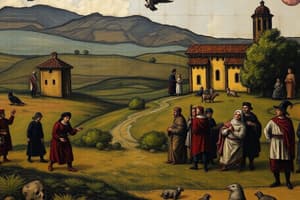Podcast
Questions and Answers
Which factor was the MOST significant in the success of the Frankish kingdom compared to other Germanic tribes during the early Middle Ages?
Which factor was the MOST significant in the success of the Frankish kingdom compared to other Germanic tribes during the early Middle Ages?
- Their rapid adoption of various pagan religions, attracting a diverse population.
- Their strategic alliance with the Pope providing them with political legitimacy and influence. (correct)
- Their focus solely on military expansion, neglecting agriculture and internal development resulting in high efficiency.
- Their isolated geographic location, which protected them from invasions and external conflicts.
How did the Migration Period MOST significantly change the cultural and linguistic landscape of Europe?
How did the Migration Period MOST significantly change the cultural and linguistic landscape of Europe?
- It caused a resurgence of Ancient Greek as the primary language of scholarship and trade across the continent.
- It led to the complete eradication of Roman cultural elements and the universal adoption of Germanic languages.
- It preserved the uniformity of the Roman Empire by reinforcing Latin as the sole language of governance and culture.
- It fostered a blend of Roman and Germanic traditions, leading to the development of new cultures and the emergence of Vulgar Latin. (correct)
What was the MOST significant long-term impact of the disruption of trade and downfall of cities during the early Middle Ages?
What was the MOST significant long-term impact of the disruption of trade and downfall of cities during the early Middle Ages?
- It contributed to the development of a decentralized, agrarian society centered around rural areas and local economies. (correct)
- It accelerated the standardization of language across Europe, fostering greater communication and cultural exchange.
- It reversed the decline of learning and knowledge, leading to the establishment of new universities.
- It facilitated a rapid transition to a fully centralized, empire-based political system.
Which of the following factors MOST accurately describes the combined influence that shaped the emergence of medieval society after the fall of the Roman Empire?
Which of the following factors MOST accurately describes the combined influence that shaped the emergence of medieval society after the fall of the Roman Empire?
How did Clovis' conversion to Christianity MOST strategically influence the expansion and consolidation of the Frankish kingdom?
How did Clovis' conversion to Christianity MOST strategically influence the expansion and consolidation of the Frankish kingdom?
Which factor was LEAST influential in the Franks becoming the most dominant tribe in the region?
Which factor was LEAST influential in the Franks becoming the most dominant tribe in the region?
How did Clovis strategically use religion to consolidate and expand his power?
How did Clovis strategically use religion to consolidate and expand his power?
What was the primary role of the 'Majordomos' (Mayors of the House) during the later Merovingian dynasty?
What was the primary role of the 'Majordomos' (Mayors of the House) during the later Merovingian dynasty?
Why was Charles Martel's victory at the Battle of Tours (732) historically significant?
Why was Charles Martel's victory at the Battle of Tours (732) historically significant?
How did Pepin the Short legitimize his claim to the Frankish throne and establish the Carolingian dynasty?
How did Pepin the Short legitimize his claim to the Frankish throne and establish the Carolingian dynasty?
What was a lasting impact of Charlemagne's reign on education and culture in his empire?
What was a lasting impact of Charlemagne's reign on education and culture in his empire?
Why was the Treaty of Verdun (843) a significant turning point in the history of the Frankish empire?
Why was the Treaty of Verdun (843) a significant turning point in the history of the Frankish empire?
What was a primary consequence of Louis the Pious' reign and the subsequent division of the Frankish empire?
What was a primary consequence of Louis the Pious' reign and the subsequent division of the Frankish empire?
Flashcards
Migration Period
Migration Period
A period of cultural/ethnic change, marking the transition from late Ancient History to the early Middle Ages (4th-7th century).
Causes of the Migration Period
Causes of the Migration Period
Included Hun invasions, search for fertile land, climate cooling, and Roman Empire weakness.
Outcomes of the Migration Period
Outcomes of the Migration Period
Tribes settled instead of destroyed, new kingdoms formed, new culture emerged (Roman + Germanic), Vulgar Latin developed.
Changes in Europe Post-Roman Empire
Changes in Europe Post-Roman Empire
Signup and view all the flashcards
The Franks
The Franks
Signup and view all the flashcards
Clovis
Clovis
Signup and view all the flashcards
Majordomos
Majordomos
Signup and view all the flashcards
Charles Martel
Charles Martel
Signup and view all the flashcards
Pepin the Short
Pepin the Short
Signup and view all the flashcards
Charlemagne
Charlemagne
Signup and view all the flashcards
Louis the Pious
Louis the Pious
Signup and view all the flashcards
Treaty of Verdun (843)
Treaty of Verdun (843)
Signup and view all the flashcards
Study Notes
The Migration Period
- Time span: the 4th-7th century
- Cultural and ethnical changes
- Transition period between Late Ancient History and early Middle Ages
The Causes of the Migration
- The invasion of the Huns
- The search for the fertile land
- The general cooling of the climate
- The weakness of the Roman Empire
The Outcomes of the Migration
- Tribes did not destroy the areas, they settled them
- New kingdoms were created
- New culture emerged: the Roman culture + Germanic customs
- Creation of a single language: vulgar Latin (language of common people)
The Changes in Europe
- Disruption of trade led to the economy being disrupted by wars among the Germanic tribes
- Downfall of cities caused people to move to countryside, the cities were abandoned and lost their value
- Decline of learning made the skills like reading and writing not very important at first
- Loss of a common language as people started to use local languages instead of Latin
- A new society emerged after the fall of the Roman Empire
The Roots of the Medieval Society
- Classical heritage of Rome
- The Benefits of the Roman Catholic Church
- Customs of the various Germanic tribes
The Franks
- The most influential tribe had:
- Military power via a well-trained army
- Farming, as they were engaged in fighting and agriculture
- Strong leaders who united the Frankish tribes
- Religion, as they adopted Christianity
Clovis
- Clovis was the first Christian leader
- Clovis gained the support of the Pope - a strategic alliance
- Latin language became official language
- Territorial expansion
The Majordomos - The Mayors of the House
- The Mayors of the House was a governmental office held by a noble man
- The most powerful people in the Frankish kingdom during the decline of royal power
- In charge of the royal court, household, and estates
- The most important function was the military leadership
Charles Martel
- Charles Martel was a mayor of the house
- He was more powerful than the king and supported by the pope
- He enlarged the territory
- The Battle of Tours in 732 was his most important battle
- His army defeated Muslim raiders who had conquered Spain in 711
- This victory stopped the Muslim expansion in Europe
Pepin the Short
- Pepin was the mayor of the house and enlarged the territory
- He cooperated with the pope
- His achievements brought him fame and power
- The pope gave him the title of
- Pepin started the new dynasty: Carolingian dynasty
Charles the Great - Charlemagne
- Limited the power of nobles
- Supported the education, established many schools
- Built the greatest empire in Western Europe - Holy Roman Empire
- Pope crowned him the emperor
Louis the Pious
-
Was a very religious but ineffective ruler
-
Was not supported by his subjects
-
Had three sons: Lothair, Charles the Bald, Louis the German
-
The sons of Louis the Pious were supposed to rule together, but they fought against each other
-
They decided to divide the empire into three kingdoms
-
They signed the Treaty of Verdun in 843 and three kingdoms were established:
- West Frankish Kingdom, ruler: Charles the Bald
- Central Frankish Kingdom, ruler: Lothair
- East Frankish Kingdom, ruler: Louis the German
Studying That Suits You
Use AI to generate personalized quizzes and flashcards to suit your learning preferences.
Description
Explore the Migration Period from the 4th to 7th century, a time of significant cultural shifts. Examine the causes, including the Hun invasion and climate changes. Discover the outcomes, like new kingdoms and the emergence of vulgar Latin, plus the disruption of trade and the decline of learning.




